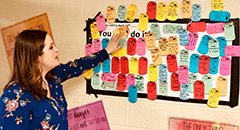Two hours north of Detroit, amid acres of farmland, Cass City Junior and Senior High School sits in a small rural town with a shrinking population. The only college in the county closed its doors a year ago; now the nearest one is an hour away. About 47 percent of the combined junior/senior high school’s 418 students come from low-income backgrounds, and many will be the first in their families to go to college. Yet inside the school, college feels anything but inaccessible. College banners, colorful and proud, are strung from the ceilings and decorate student lockers. Students regularly celebrate their college goals and participate in planning activities that serve as spirited reminders of their power to shape their own futures.
Your future, 101

Since starting her position at the school six years ago, Dean of Students Christin Hempton, who also serves as the school counselor, has put all of her efforts into engineering Cass City Jr./Sr. High School’s college-focused culture. To spark the school’s transformation, she and teacher Ryan Walker designed the most critical piece of their college access plan: a senior seminar that helps all students set and achieve postsecondary goals.
Each day in the senior seminar, twelfth graders gather for a class that is all about their future. The walls of the classroom are adorned with posters that mark students’ progress on college applications, and ceiling tiles are painted with college logos.
While the seminar is far from the first stage of the high school’s postsecondary planning process, it provides an essential opportunity for students to receive individualized support as they research their goals, apply for programs, or prepare for the workforce. In addition to creating sound postgraduate plans, students learn networking and interviewing skills and are required to create a portfolio, complete with a resume and three letters of recommendation. The course is a graduation requirement, and based on the intensive research and writing involved, it also counts as students’ twelfth grade English class.
Since the senior seminar’s inception, the number of students who enroll in two- or four-year college right after high school has increased from 59 to 74 percent — 58 percent go to a four-year college, which is well above the state average of 39 percent. Other students join the military or pursue certifications that will increase their earning potential in the workforce. There’s still progress to be made: only 53 percent of college-bound seniors return to college for their second year, a number that is below the state average.
Senior Megan Graham, who plans to attend a nursing program at Grand Valley State University, can’t imagine why other schools don’t offer the senior seminar. “Being forced to sit down and make a decision was a big motivation,” she laughs. Now, she’s glad to have gotten the extra push to plan her future. Once she decided on nursing, she began strategically taking dual-enrollment classes through the closest community college to fulfill requirements for her nursing degree.
Supporting families through the process
To prepare students for the application process, Hempton sits down for individual meetings with students and their parents during their junior year. She explains every element of the college application process, from finding the right programs to applying for and understanding financial aid. While it takes effort on “every channel of communication you can imagine,” Hempton says that ultimately 90 percent of parents meet with her to talk through their child’s future plans.
For students in Cass City, barriers to college can be immense. Lack of parental engagement, Hempton says, can be a significant obstacle for students at the junior/senior high school. Some parents just don’t know how to help. Others may be resistant to filling out the FAFSA or supporting students’ college goals.
Typically, Hempton says, the parents who are reluctant to apply for financial aid have children who would benefit the most. She tries to demystify and destigmatize the process for families who express reluctance. “I make phone calls home and try to break down the barriers,” she says. “I do probably 15 FAFSAs per year with kids and parents, where we sit together and go step by step.”
That support doesn’t stop when applications are submitted — or even after graduation. If a student can’t afford to pay a school’s tuition deposit by the required deadline, Hempton calls the admissions office to figure out a plan. After graduation, she sends cards with messages of encouragement. If students reach college and find themselves struggling, they know they can always ask Hempton or Walker for help. “We reassure them that we’re still here for them,” Hempton says.
A path for every student

To help all students make the most of their plans, students are supported through rigorous academic opportunities and personal attention, whether they are interested in going to college, entering the workforce, or getting a vocational degree after they graduate.
Hempton and Principal Chad Daniels strive to make sure students have access to opportunities for advancement no matter what their plans may be. In addition to offering dual-enrollment and AP courses — both on campus and online through Michigan Virtual — the high school has an agriculture program, a wood shop, and a partnership with a local technical center.
“We have a clear vision of where we want to go,” says Daniels, “and that vision includes not only kids being successful while they’re here, but being prepared when they walk across that stage. No matter what you want to do, we need to get you ready so you have more opportunities when you graduate.”
After graduation, senior Reed White plans to attend a two-year program at Delta College and launch a career as an electrician. He is grateful that Cass City Jr./Sr. High School’s strong systems of support encouraged him to fully research his plans, and he’s excited for his future. He says the school prepared him well. “I always took the highest-level classes I could here,” he says with a smile. “And all the hard work paid off.”
GreatSchools’ College Success Awards honor public high schools in nine states that are doing a great job of preparing students for postsecondary success. Learn more about the award, see the list of winners, and read about more award winners here.







